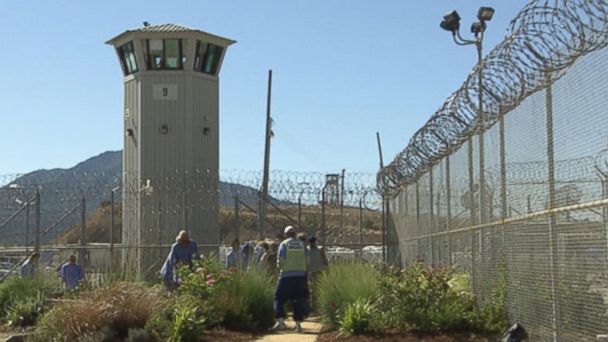Prison Gardens Grow New Lives for Inmates
ABC News' Bill Ritter reports:
From Enfield, Conn., to New York City and the San Francisco Bay, lush gardens filled with ripe fruits, vegetables and flowers are growing in unexpected places - prison yards.
Prisons use them to rehabilitate inmates and to teach them basic landscaping skills that they can use to get jobs. All of the prisoners involved in each garden's program are eligible for release.
Related: From Prison to Poetry - Former Criminal Advocates for Juvenile Justice Reform
Bernard, 46, who's been in trouble with the law about 10 times in the last 30 years, now helps in the gardening efforts at the Willard Cybulski Correctional Institution in Enfield, Conn.
"I get a sense of peace and a sense of serenity being that I'm in a hostile environment at times and then coming out here to pick these vegetables. It brings calmness to me," Bernard said.
For the last three years, all 18 state prisons in Connecticut have had garden programs. None cost taxpayers money.
Last year, Connecticut prisons produced more than 35,000 pounds of produce - saving taxpayers $20,000 a year by putting produce back into the prison system. Additional food is donated to charities.
Related: The Problem With Sheriff Joe Arpaio's Tent City
"We give 25 percent of what we pick back to the community and that's the most fulfilling thing, that I'm helping someone, because in my life I have taken in trouble so, to me, it's almost like paying back a debt to be able to pick something and be able to give back to others," Bernard said.
"We believe that everybody has a heart and everybody has a chance for transformation," said Beth Waitkus, the director of the Insight Garden Program that started 10 years ago at San Quentin prison. "What happens with gardening is … they reconnect to themselves. They reconnect to their feelings. They reconnect to each other as a community, a small community in the prison, and they really reconnect to nature. And, I think that offers a huge opportunity for transformation when we reconnect to ourselves and to the natural world."
"I've been in and out since I've been 15 and this is the first time I've done something like this. I can connect spiritually with something as simple as garden. … To me that was different," said Rasheed, who has already served two years and has six years left on his term.
While Waitkus spends her time in San Quentin teaching inmates how to plant flowers, take care of soil and prune plants, she also keeps the connection strong once they leave prison. Nationally, the recidivism rate is more than 60 percent, according to the 2011 Annual Recidivism Report.
For garden prisoners at San Quentin, Waitkus said the return rate is less than 10 percent, and most other prison gardens report return rates in the single digits. In Connecticut, officials say not one of the garden graduates has returned.

ABC News photo
"The garden program to me in San Quentin was really therapeutic because it breaks up the monotony of everyday life in prison and I also used to watch my mom garden, so it kind of brought me back to when I was a child, and it's just a real calming effect in a real, not normal place," said Kevin Williams who has been out of prison since 2012.
He now works for a group called Planting Justice, which gets jobs for released prisoners who have gone through the garden project at San Quentin.
"It feels great. And even when I was inside, people would ask me, 'Kev, why do you seem so happy all the time?' [It was] because you know, we're blessed. We've got another chance to go home and get it right," he said.
"What we're trying to do here is to bring people together, find their inner gardener. If they're successful and not committing crimes, we are indeed creating a safer, more humane society," Waitkus said.